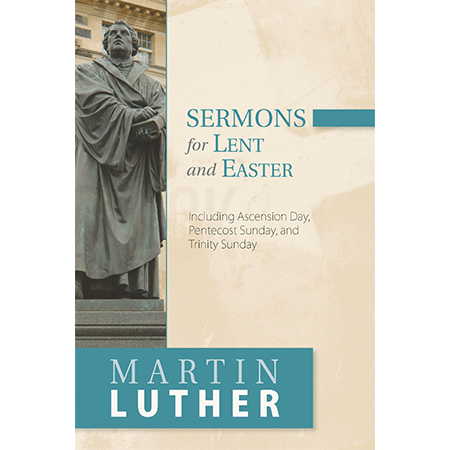Martin Luther's Sermons on Lent and Easter

Aug 17, 2017
 For this 500th anniversary year of the Protestant Reformation, Hendrickson Publishers is reprinting a wonderful selection of sermons from Martin Luther. So far there are three volumes of sermons for Advent and Christmas Day, the Sunday after Christmas, New Year’s Day, and Epiphany, and Lent and Easter, which also includes Ascension Day, Pentecost Sunday, and Trinity Sunday. I recently immersed myself in this final volume on a trip and want to commend it to you for three reasons—aren't I ever the preacher!
For this 500th anniversary year of the Protestant Reformation, Hendrickson Publishers is reprinting a wonderful selection of sermons from Martin Luther. So far there are three volumes of sermons for Advent and Christmas Day, the Sunday after Christmas, New Year’s Day, and Epiphany, and Lent and Easter, which also includes Ascension Day, Pentecost Sunday, and Trinity Sunday. I recently immersed myself in this final volume on a trip and want to commend it to you for three reasons—aren't I ever the preacher! First, we need to tap into the well of historic Christian preaching. I say this not only that you will be able to quote lines from Luther in your sermons, but as a preacher, there are so many preaching textbooks available to us that the task can become formulaic. Reading Luther's sermons is reading a man who was undergoing similar pressures I undergo as a pastor and preacher, but doing so under the added weight of the world on his shoulders. In his preaching you hear how the Holy Spirit worked through him in his particular moment.
Second, sermons such as these help those of us who at least occasionally preach seasonal or festival sermons that highlight the work of our Lord. I’ve made the case elsewhere for an historic Reformed practice of the evangelical feast days (I'm not that Puritan), so I won’t do that here. What I want to say here is that as a preacher who has done this over the course of 17 years in one congregation, this practice can lead to panic and despair: “I’ve preached 10 Easter sermons; I have nothing else to say!” Have no fear, Luther is here! Reading such sermons would also be a valuable meditative practice for all Christians as well.
Finally, these particular sermons on the season of Lent and Easter, as well as the particular days of Ascension, Pentecost, and Trinity are treasures. For example, his first sermon in Lent is on the fasting and temptation narrative of Jesus Christ from Matthew 4. After denouncing false fasting (trying to emulate Christ’s 40 days/night, doing it in a man-made way, and worst of all, as a good work before God), he says this: “It would have been better had people been drunk day and night than to fast thus” (2). Typical Luther! On the contrary, there are two kinds of true fasting: that which we voluntarily undergo and that which God imposes on us (2). It’s this first kind that he focuses in on for instruction and admonition. Matthew 4 is for our instruction: “we should know how Christ has served and helped us by his fasting, hunger, temptation, and victory; also, that whoever believes on Christ shall never suffer need, and that temptation shall never harm him (3). It’s also for our admonition: “that we may in the light of this example also cheerfully suffer want and temptation in the service of God and the good of our neighbor” (3).
Read Luther, not only the theologian, but the preacher. It is good for your soul.





